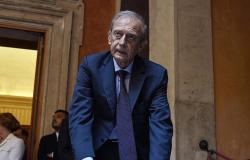
TRIESTE Perhaps this year’s city Via Crucis will seem strange, or at least unusual. Because if it is true that each of us, It goes without saying, carries his cross, it is equally true that there is a good part of the world – with its wars, terrorism and miseries – that suffers more. «The fact – Bishop Enrico Trevisi observes in a calm voice – is that in Trieste we have the world at home».
It is with this gaze that on Friday evening, starting at nine, Monsignor Trevisi will lead the “city Via Crucis”, animated by the young people of the diocesan Catholic Action, from Piazza Vico to San Giusto. And if the gaze is based on an international dimension, he will not miss a thought, a message, which is intended as a caress, to the small and large individual sufferings. «Our crosses», precisely.
«We live in an individualistic and complaining society», explains the prelate in the text prepared for Holy Easter and which will accompany the Triduum. A «sad society, due to the continuous competition in which we debase ourselves in ephemeral consumption. Accustomed to the attempt at mass distraction, while outside the world is falling apart: the war rages, couples are separated, the demographic winter advances, the tragedy of many lonely people. Scared of the future, we need to fall back on some precarious success: a career, individual well-being, exotic holidays… All palliative solutions – the bishop says – quicksand that locks us into solitude. Always better than depression which instead nails and paralyzes in the black diagnoses of many commentators. The depressed person is like a traffic policeman – he underlines again, quoting Alda Merini – always fixed on his catastrophe. Jesus is the God who became man: flesh, to say vulnerability, finiteness. Easter shows him to us as the slandered, the offended, the excluded, the humiliated. He killed him. But then he gets up. He is alive. He is risen. He did not come to condemn us, but to raise us up. To resurrect us to a new life.”
Monsignor Trevisi, what impact do you intend to leave on the city’s Via Crucis, your first as bishop of Trieste?
«The Via Crucis, coordinated by Catholic Action, also involves the city’s young people of different backgrounds and origins in the preparation of the texts. However, the underlying meaning is this: let’s not get used to the fact that there are so many wars.”
What does he mean?
«There cannot be an habit whereby we resign ourselves to war and sooner or later it will happen to us too. I feel the commitment and commitment to peace are very strong. We are in a land, Trieste, where I am still feeling many wounds from the past. And I feel they are greater than my homeland, Lombardy.”
Why do you feel the need to send this message of peace from Trieste?
«In recent months I have entered into the confidence of many people and I have also read pages of history that I did not know, from which I realized that pain passes from generation to generation. Sometimes it is elaborated and purified and one does not remain in the cage of resentment, but nevertheless it still remains for the wrongs suffered. I wonder how long it will take for Israel and Palestine, rather than Ukraine and Russia. But let’s think about Syria, Iran, Afghanistan, Congo. In this Via Crucis the young people tried to identify with the people who live their Via Crucis in different parts of the world, oppressed by violence and injustice. We intend to step into the shoes of those who are undergoing this: this represents a compromise on our part to invite us to ask ourselves, personally, what men and women we are. Are we working to resolve conflicts in our lives and families too? Or in work and also in the Church?”.
It will therefore be a general look that then focuses on our individual lives.
«Three months ago we opened the dormitory in via Sant’Anastasio, where there are people of various nationalities. With their suffering, their stories. This makes us understand that we have the world at home. It doesn’t just come in through television. Pakistan, Afghanistan, Iran, Turkey, Syria, Nigeria are the countries of these people who pass through, transit here and ask to be welcomed. We cannot think of looking only at our city, when our city is on the Balkan route, it is a bridge towards the East. And it has always been like this: Trieste is a port where people from other parts of the Mediterranean have always arrived by ship. Peoples who met here. But let’s not forget the problems of the city: companies closing, elderly people alone, the difficulties of families… but we must be attentive to other worlds. And at the foot of the Cross we look at the mystery of a God who chose to humble himself for us. Looking at the Crucifix we know that we can claim the right to a gesture of brotherhood, of tenderness, of forgiveness, towards those around us.”



